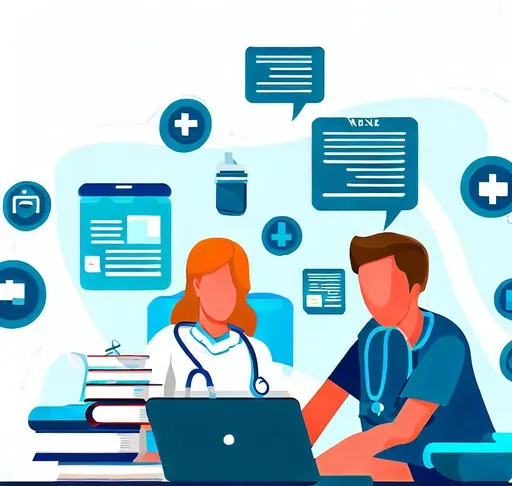Why Healthcare Informatics is a Must-Know for Modern Nurses

What is Healthcare Informatics?
Healthcare informatics, also known as nursing informatics when applied to nursing practice, is the integration of information technology and healthcare science to manage and process data for improved patient care. It involves the use of electronic health records (EHRs), clinical decision support systems, telehealth technologies, and various software applications to collect, store, and analyze patient data. The primary goal of healthcare informatics is to make data-driven decisions that lead to better patient outcomes.

Why Healthcare Informatics is Essential for Modern Nurses
Healthcare informatics is essential for modern nurses because it empowers them to access and utilize crucial patient information efficiently, leading to enhanced care delivery and reduced errors. Additionally, informatics skills enable nurses to collaborate seamlessly with interdisciplinary healthcare teams and adapt to the ever-evolving technological landscape, ensuring they remain at the forefront of healthcare innovation.
- Enhanced Patient Care
- Increased Efficiency
- Data-Driven Decision-Making
- Telehealth and Remote Monitoring
- Improved Interdisciplinary Collaboration
- Job Satisfaction and Career Advancement
- Adaptation to Technological Advancements
- Regulatory Compliance
One of the most significant advantages of healthcare informatics for modern nurses is its ability to enhance patient care. With access to electronic health records, nurses can quickly retrieve a patient's medical history, medication list, and treatment plans. This instant access to critical information enables nurses to provide more personalized care, make informed decisions, and reduce the risk of medication errors.
Additionally, clinical decision support systems help nurses by providing evidence-based guidelines and alerts for potential drug interactions or allergies. This ensures that patients receive safe and effective care, contributing to improved patient outcomes.
Healthcare informatics streamlines nursing workflows, making them more efficient and less prone to errors. Nurses can use electronic documentation tools to record patient assessments, interventions, and outcomes in real-time. This eliminates the need for time-consuming paperwork and allows nurses to spend more time at the bedside.
Furthermore, informatics tools automate many administrative tasks, such as appointment scheduling and billing, reducing the administrative burden on nurses. This increased efficiency enables nurses to focus on what they do best – providing patient-centered care.
In the modern healthcare environment, data is a valuable asset. Healthcare informatics equips nurses with the skills to collect, analyze, and interpret data to make informed decisions. By studying trends and patterns in patient data, nurses can identify areas for improvement in patient care and workflow processes.
For example, nurses can use informatics to track infection rates, medication adherence, or patient satisfaction scores. This data-driven approach enables healthcare teams to implement evidence-based interventions and continuously improve the quality of care.
Telehealth has become increasingly prevalent in healthcare, especially in light of the COVID-19 pandemic. Nurses who understand healthcare informatics can effectively participate in telehealth initiatives, providing remote patient monitoring, virtual consultations, and telemedicine services.
Through telehealth, nurses can monitor patients with chronic conditions from the comfort of their homes, reducing hospital readmissions and improving overall patient outcomes. This not only benefits patients but also contributes to the cost-effectiveness of healthcare delivery.
Healthcare informatics promotes interdisciplinary collaboration among healthcare providers. Modern nurses need to communicate and coordinate care with physicians, pharmacists, physical therapists, and other professionals. Electronic health records and digital communication tools facilitate seamless information sharing and collaboration.
Nurses can quickly share patient updates, lab results, and treatment plans with the entire healthcare team, ensuring that everyone is on the same page. This interdisciplinary approach leads to better-coordinated care and improved patient safety.
Understanding healthcare informatics opens up new career opportunities for nurses. Many healthcare organizations value nurses with informatics skills as they play a pivotal role in optimizing technology and improving patient care.
Nurses who specialize in healthcare informatics can pursue roles such as clinical informatics specialists, EHR trainers, or nurse consultants for healthcare IT companies. These roles often come with higher earning potential and opportunities for career advancement.
The healthcare field is continually evolving, with new technologies and innovations emerging regularly. Nurses who are proficient in healthcare informatics are better prepared to adapt to these changes and leverage new technologies to improve patient care.
Whether it's the implementation of artificial intelligence in diagnostics or the use of wearable devices for patient monitoring, informatics-savvy nurses can stay at the forefront of healthcare innovation.
Healthcare is highly regulated, and healthcare informatics plays a crucial role in ensuring compliance with these regulations. Modern nurses need to understand the legal and ethical considerations surrounding patient data privacy and security.
Training in healthcare informatics helps nurses adhere to regulations such as the Health Insurance Portability and Accountability Act (HIPAA) and ensures that patient data is handled with the utmost care and confidentiality.
Conclusion
Healthcare informatics is not just a skill; it's a necessity for modern nurses. It enhances patient care, increases efficiency, supports data-driven decision-making, and opens up new career opportunities. In today's technology-driven healthcare landscape, nurses who embrace healthcare informatics are better equipped to provide high-quality care, adapt to technological advancements, and contribute to better patient outcomes. Therefore, every nurse should consider healthcare informatics a must-know skill to excel in their profession and meet the evolving demands of modern healthcare.